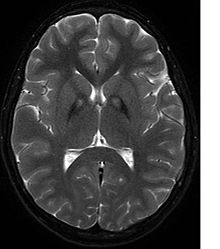Pantothenate kinase-associated neurodegeneration
A neurodegeneration with brain iron accumulation that has_material_basis_in autosomal recessive inheritance of mutation in the PANK2 gene on chromosome 20p13.
Pantothenate kinase-associated neurodegeneration or Hallervorden Spatz disease is a rare disease. People with this disease have dementia, or extreme forgetfullness, and their face my twitch. Hallervorden-Spatz disease is degenerative brain disease, meaning the longer a person has it the worse the effects become. Scientists think it is caused by a build up of too much Iron in the brain.

Symptoms
changeThe effects of the disease usually start at a young age and often result in a quick death. Some effects include:
Related pages
change- ICD G 23.0
Other websites
change- Defining Mutation Found in Hallervorden-Spatz Syndrome
- 1H MR Spectroscopy and Relaxometry for the Determination of Iron and Metabolite Concentrations in Hallerworden-Spatz Syndrome Patients Archived 2016-03-04 at the Wayback Machine
- Zumrova Alena et al. 2005. First cases in the Czech Republic of the Hallervorden-Spatz Disease resulting from mutation in the Pantothenate Kinase 2 Gene Neuroendocrinology Letters No.3:26